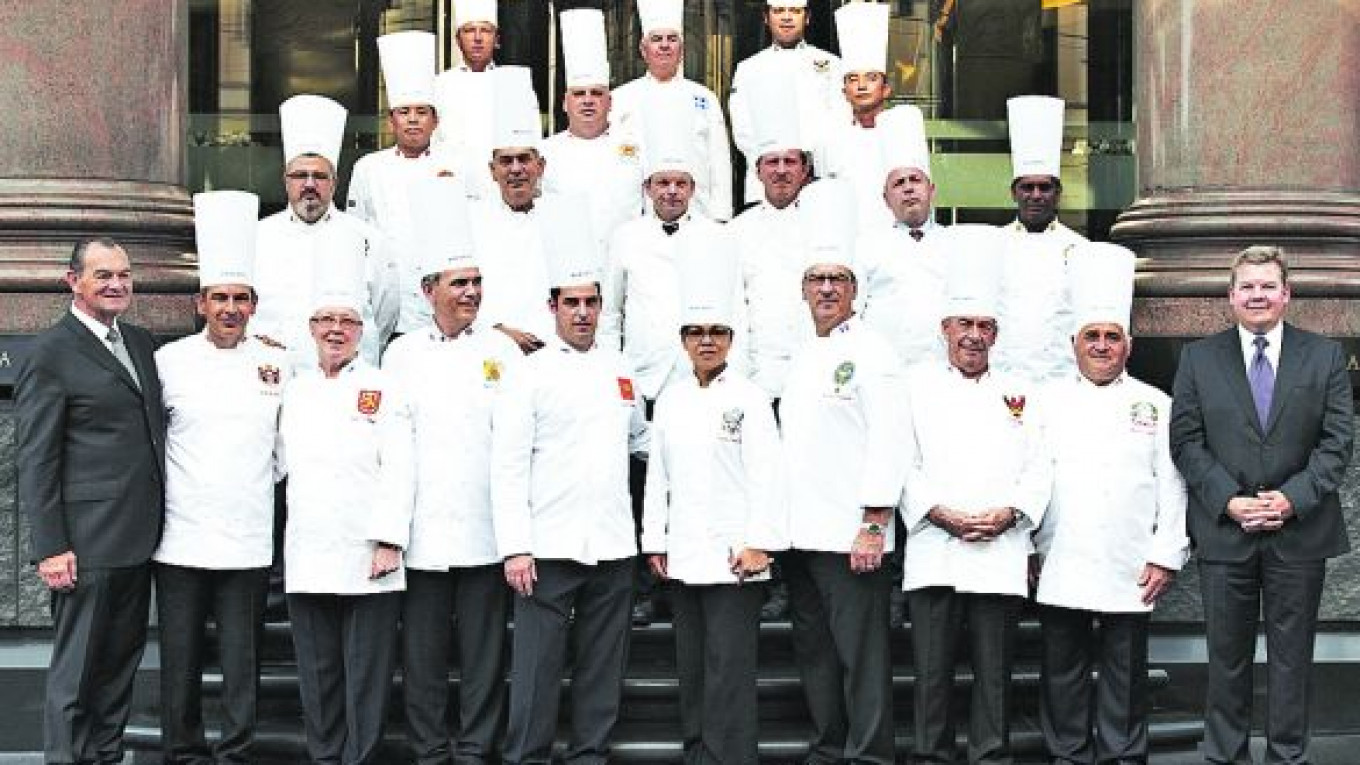Moscow may not be considered the culinary capital of the world, but recently 20 of the world’s best chefs met here to exchange recipes and tips on what to serve world leaders.
The gathering was the annual meeting of the Club des Chefs des Chefs, or Club of Leaders’ Chefs, the most exclusive culinary club in the world. Members must be the personal chef of a head of state or organizer of official banquets in countries where the head of state has no full-time chef. Only one chef per country is accepted, with the exception of China and Italy, which each maintain two top chefs. Currently, the club has just over 30 members.
The Club des Chefs des Chefs meets every year in a different country. This year’s meeting, the club’s first in Russia, was organized by Jerome Rigaud, executive chef of the Kremlin.
Gilles Bragard, the designer who founded the club in 1977, was on hand as the group of chefs, which he referred to as the “C-20,” met at the Ararat Park Hyatt hotel to take questions. In addition to Rigaud and Bragard, high-profile guests included Cristeta Comerford, chef to U.S. President Barack Obama, and Mark Flanagan, chef to Queen Elizabeth II of Great Britain.
“It is a big responsibility” to cook for the head of state, Bragard explained. The job consists not only of keeping the leader happy and well-nourished, but also keeping an eye on food security and cooking state dinners, where all parties’ dietary restrictions and preferences must be taken into account. A head chef “is in that way the ambassador of local cuisine and products.” Bragard summed up the importance of the position with a quote from 19th-century French diplomat Charles de Talleyrand: “Give me good chefs, and I will make good treaties.”
All the chefs are regularly asked: “What is your boss’s favorite food?” But that is their most closely guarded secret. Christian Garcia, chef to Prince Albert II of Monaco, said the prince enjoys Mediterranean food, but added that if any chef were to divulge the favorite dish of a head of state, that leader would be served that dish everywhere he or she travels. The other chefs kept mum even on a favorite type of cuisine.
Attention focused on specific dietary and preparation practices for various leaders. Comerford said the lessons of Michelle Obama’s anti-obesity campaign are taught at home as well. “One of our main roles as a chef is to make sure anything we stand for, any initiatives we promote, are something we do on the home front. Having a healthy meal at home is not that hard to do,” she said.
Comerford began working in the U.S. White House under President Bill Clinton and also served as head chef to President George W. Bush, making her position one of the few that does not change along party lines. One party is not more difficult to cook for than the other, she assures, nor has any of the presidents she has worked for been particularly picky. “They’re just regular people” who enjoy simple, nourishing foods “from your own pantry,” or, in the first lady’s case, from the kitchen garden, she said.
Rigaud said security around food at the Kremlin is high. All ingredients are analyzed in a lab for safety before they are used in food preparation. “Are they still fresh?” one reporter asked. They are, Rigaud replied.
Rigaud, a Frenchman who learned the trade in his home country, came to Russia nine years ago to work at El Dorado, a Mexican restaurant in Moscow. He has served as the official Kremlin chef under President Dmitry Medvedev for the past three years and has also cooked for Prime Minister Vladimir Putin during that time.
A Message from The Moscow Times:
Dear readers,
We are facing unprecedented challenges. Russia's Prosecutor General's Office has designated The Moscow Times as an "undesirable" organization, criminalizing our work and putting our staff at risk of prosecution. This follows our earlier unjust labeling as a "foreign agent."
These actions are direct attempts to silence independent journalism in Russia. The authorities claim our work "discredits the decisions of the Russian leadership." We see things differently: we strive to provide accurate, unbiased reporting on Russia.
We, the journalists of The Moscow Times, refuse to be silenced. But to continue our work, we need your help.
Your support, no matter how small, makes a world of difference. If you can, please support us monthly starting from just $2. It's quick to set up, and every contribution makes a significant impact.
By supporting The Moscow Times, you're defending open, independent journalism in the face of repression. Thank you for standing with us.
Remind me later.






